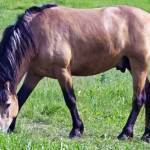How Do Horses Know When To Say When?

Horses eat like it’s their job.
Consider the nutritional behavior of horses:
- They graze for approximately 12-16 hours in a 24-hour period;
- Between 60 and 70% of that grazing occurs in the day, leaving 30-40% at night;
- Horses only interrupt their feed intake to partake in resting, social, and comfort activities.
“Horses are engineered to forage, and other motivations must overrule the foraging urge,” explained Kathleen Crandell, Ph.D., a nutritionist for Kentucky Equine Research. Everyday physiologic roadblocks, as we know them, don’t apply to horses: they don’t feel a sense of satiety or “fullness” like humans do after a large meal, nor do their facial muscles fatigue from nonstop chewing.
“For thousands of years horses have had access to an extensive array of plant species, but grazing areas were hit-and-miss, often spread out over wide expanses of land. Those diets were rich in fiber, ideal for hindgut fermentation, and low in simple sugars and starch,” Crandell continued.
Because of this evolutionary drive to continuously forage, horses do not change their grazing behaviors based on their energy demands. They will continue to consume forages or feed, even if they have already procured sufficient calories to meet their needs. With this in mind, it is easy to see how modern horses become overweight.
“Because most horses will devour basically whatever is offered to them, owners must monitor body condition and feed them appropriately,” recommended Crandell.
Dietary strategies often revolve around calorie restriction. Obese horses are often fed diets composed predominantly of appropriate forages. A balanced ration can be ensured by offering a low-intake source of concentrated vitamins and minerals.
Many chronically overweight horses are predisposed to developing metabolic disease as they age. To maintain health as these horses move into their teens and twenties, it is important to devise and adhere to an exercise regime. Daily exercise will also help with weight loss and overall improvement of health.
*Baumgartner, M., T. Boisson, M.H. Erhard, et al. 2020. Common feeding practices pose a risk to the welfare of horses when kept on non-edible bedding. Animals (Basel) 10(3).








